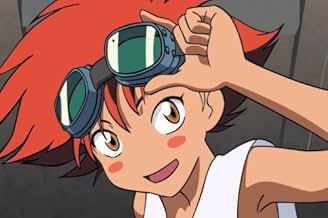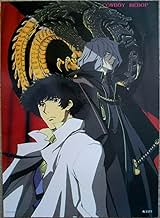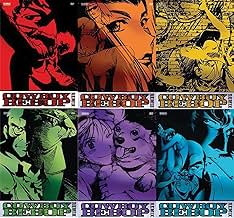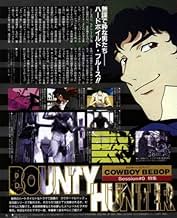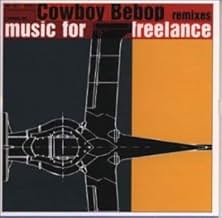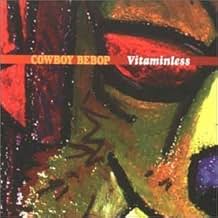Die futuristischen Missgeschicke und Tragödien eines unkomplizierten Kopfgeldjägers und seiner Partner.Die futuristischen Missgeschicke und Tragödien eines unkomplizierten Kopfgeldjägers und seiner Partner.Die futuristischen Missgeschicke und Tragödien eines unkomplizierten Kopfgeldjägers und seiner Partner.
Folgen durchsuchen
Handlung
WUSSTEST DU SCHON:
- WissenswertesThe city of Faye's memories is recognizably Singapore.
- PatzerSpike's hair changes from green to black repeatedly throughout the show.
- Zitate
Spike Spiegel: Hunger is the best spice they say.
- Crazy CreditsMost of the episodes end with an intertitle that reads "SEE YOU SPACE COWBOY..." However, certain episodes end with different text: Session #03: EASY COME, EASY GO... Session #11: THE END Session #12: TO BE CONTINUED Session #13: DO YOU HAVE A COMRADE? Session #15: SLEEPING BEAST... Session #17: LIFE IS BUT A DREAM... Session #22: SEE YOU SPACE SAMURAI... Session #24: SEE YOU COWGIRL,SOMEDAY, SOMEWHERE! Session #25: TO BE CONTINUED Session #26: YOU'RE GONNA CARRY THAT WEIGHT.
- Alternative VersionenIn "Session 22 Cowboy Funk" Spike, Jet and Faye go to a costume party to catch a bounty head. Jet is dress up as an hippy with a marijuana leaf on his shirt.In the TV version Cartoon Network edited out the leaf and replaced it with a peace sign.
- VerbindungenFeatured in Cowboy Bebop: Session XX - Mish-Mash Blues (1998)
Ausgewählte Rezension
Cowboy Bebop is a truly post-modern show. Not in the tired "Scream" sense of self-awareness, but in its willingness to mix genres and blur boundaries. At the most basic level it's a Space Western. But Bebop is not content to be merely that, so there are added dashes of film noir, gothic horror, creature-feature, black comedy, screwball comedy, spy action, crime, romance, tragedy, action, philosophy, science, spirituality, fatalism, optimism, buddy-buddy stories, slapstick humour, parody-- just about every type of tale under the sun appears in some shape or form during Bebop's run. It's a show where each episode really is different from the last. Were it not for the recurring characters, it would be hard to believe that the brightly-coloured blaxploitation parody "Mushroom Samba" could possibly come from the same series as the bleakly violent "Real Folk Blues".
The world that the series inhabits is distinctly post-modern, too; space ships fly through hyperspace gates, but once on the ground their pilots fight with twentieth-century handguns. Scenic bays would look for all the world like they were taken from modern-day Japan were they not dwarfed by Jupiter, the enormous gas giant looming in the sky like some enormous benevolent god.
And the music - tribal drums and chants give way to electronic pulses that give way to jazz sax and trumpets that give way to rock guitars that give way to blues harmonicas... composer Yoko Kanno faultlessly turns her hand to an eclectc selection of genres and instruments, ably backed up by her band, "Seatbelts".
All of which sounds terribly impressive, but why on Earth should you watch it? Because, buddy, it's one of the finest television shows ever made.
I have to admit I'm not a big anime fan. Most anime that makes it over here seems to be either about schoolgirls with supernatural powers who battle evil, or adolescent boys who - for some convoluted reason - wind up having to pilot big giant robots. And whilst I'm assured that shows such as Escaflowne (schoolgirls and magic) and Evangelion (boys and robots) are actually rather good, they completely fail to get my blood pumping.
Enter Bebop. Ultra cool Spike, grumpy strategist Jet, trigger-happy Faye, nutball Ed and intelligent dog Ein are as far away from the usual brats and bots anime as you can possibly get. Their motivation, too, is far from the usual anime fare. These guys aren't bounty hunters because they want to fight crime and keep the peace - all they want is a wad of cash, and bounty hunting seems like the best place to make big money fast. Although they will do the right thing when pressed, they rarely forget their true motivation - and if they do, their perpetual lack of food will soon remind them. Life isn't easy, and when you're a bounty hunter it's even harder.
Not that the crew of the spaceship Bebop are one-note characters. As the series progresses, our initial assumptions about the characters are overturned. At first Spike appears to be the cliched laid-back slacker (who just happens to be a mean jeet-kun-do fighter), but we then learn of his fall from the criminal underworld and of a loss that killed him emotionally. Jet's the obvious gruff authority figure, until we realise that he actually cares for the crew of the Bebop as if they were his kids (and seems to have dabbled in pot and psychadelic drugs when he was a teenager). Faye's the usual feisty stand-offish female lead but only because her amazingly tragic past makes her push away friends for fear that she'll become attached to them. Ed's just some nutty kid until we meet her crazy father and realise that it could well be her deprived childhood that sent her over the edge. And Ein? Well sometimes it's hard being a super intelligent Welsh Corgi on a ship where nobody appreciates you, you know?
But not every episode is deathly serious - the character development is mixed in perfectly with humour (both light and dark), fistfights, shoot-outs, car chases, aerial fights, space battles and some of the lushest animation you'll see in an animated TV series. And all of this spread over only 26 episodes.
Yes, many people espouse the old "leave 'em wanting more" line, but so few of them actually do it; Buffy the Vampire Slayer is the perfect example of a series that spends three or four years being top-notch TV then freefalls due to apparent apathy from both the cast and writers. Bebop avoids this by wrapping every dangling plot thread up in just one season of television. And after the final jaw-dropping episode it's quite clear that the series is most definitely over.
Never before or since have I seen a series of such astonishing variety, intelligence and style. Ten out of ten.
The world that the series inhabits is distinctly post-modern, too; space ships fly through hyperspace gates, but once on the ground their pilots fight with twentieth-century handguns. Scenic bays would look for all the world like they were taken from modern-day Japan were they not dwarfed by Jupiter, the enormous gas giant looming in the sky like some enormous benevolent god.
And the music - tribal drums and chants give way to electronic pulses that give way to jazz sax and trumpets that give way to rock guitars that give way to blues harmonicas... composer Yoko Kanno faultlessly turns her hand to an eclectc selection of genres and instruments, ably backed up by her band, "Seatbelts".
All of which sounds terribly impressive, but why on Earth should you watch it? Because, buddy, it's one of the finest television shows ever made.
I have to admit I'm not a big anime fan. Most anime that makes it over here seems to be either about schoolgirls with supernatural powers who battle evil, or adolescent boys who - for some convoluted reason - wind up having to pilot big giant robots. And whilst I'm assured that shows such as Escaflowne (schoolgirls and magic) and Evangelion (boys and robots) are actually rather good, they completely fail to get my blood pumping.
Enter Bebop. Ultra cool Spike, grumpy strategist Jet, trigger-happy Faye, nutball Ed and intelligent dog Ein are as far away from the usual brats and bots anime as you can possibly get. Their motivation, too, is far from the usual anime fare. These guys aren't bounty hunters because they want to fight crime and keep the peace - all they want is a wad of cash, and bounty hunting seems like the best place to make big money fast. Although they will do the right thing when pressed, they rarely forget their true motivation - and if they do, their perpetual lack of food will soon remind them. Life isn't easy, and when you're a bounty hunter it's even harder.
Not that the crew of the spaceship Bebop are one-note characters. As the series progresses, our initial assumptions about the characters are overturned. At first Spike appears to be the cliched laid-back slacker (who just happens to be a mean jeet-kun-do fighter), but we then learn of his fall from the criminal underworld and of a loss that killed him emotionally. Jet's the obvious gruff authority figure, until we realise that he actually cares for the crew of the Bebop as if they were his kids (and seems to have dabbled in pot and psychadelic drugs when he was a teenager). Faye's the usual feisty stand-offish female lead but only because her amazingly tragic past makes her push away friends for fear that she'll become attached to them. Ed's just some nutty kid until we meet her crazy father and realise that it could well be her deprived childhood that sent her over the edge. And Ein? Well sometimes it's hard being a super intelligent Welsh Corgi on a ship where nobody appreciates you, you know?
But not every episode is deathly serious - the character development is mixed in perfectly with humour (both light and dark), fistfights, shoot-outs, car chases, aerial fights, space battles and some of the lushest animation you'll see in an animated TV series. And all of this spread over only 26 episodes.
Yes, many people espouse the old "leave 'em wanting more" line, but so few of them actually do it; Buffy the Vampire Slayer is the perfect example of a series that spends three or four years being top-notch TV then freefalls due to apparent apathy from both the cast and writers. Bebop avoids this by wrapping every dangling plot thread up in just one season of television. And after the final jaw-dropping episode it's quite clear that the series is most definitely over.
Never before or since have I seen a series of such astonishing variety, intelligence and style. Ten out of ten.
- wilko_3000
- 29. Dez. 2002
- Permalink
Top-Auswahl
Melde dich zum Bewerten an und greife auf die Watchlist für personalisierte Empfehlungen zu.
- How many seasons does Cowboy Bebop have?Powered by Alexa
Details
- Laufzeit24 Minuten
- Farbe
- Sound-Mix
- Seitenverhältnis
- 1.33 : 1
Zu dieser Seite beitragen
Bearbeitung vorschlagen oder fehlenden Inhalt hinzufügen



